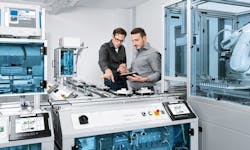Qualification for Industry 4.0 – Advanced Manufacturing
The enormous rise in the quantity of data and in the complexity of plant networks and company divisions is changing our production processes and is requiring new qualifications solutions.
For the operation and ongoing optimization of facilities, to maximize adaptability, and to develop flexible, intelligent components, one needs to communicate both a general understanding of digital, fully automated production technologies and in-depth knowledge of the structure and programming of digital facility networks.
The Festo Group takes a holistic approach:
The company’s customers receive the newest networked automation technology with a maximum level of flexibility, safety and speed of delivery as well as full consultation and qualification services for “lean and digital production.” Educational institutions receive learning systems and programs that prepare skilled staff for digital production.
All solutions are modular in structure:
The practical training in the use of new technologies is conducted using the cyber-physical research and learning platform “CP Factory”. The platform replicates the workstations of a real production facility and makes it possible to learn how to program facilities, set up networks and optimize many other aspects such as energy-efficiency and data management. In addition, the CP Factory can also be used to develop and test flexible software solutions prior to their implementation in practice in the production facility.
Learning factory
The CP Factory is part of a holistic learning factory solution – a modular learning environment that can be used to qualify personnel in the operation of a particular production process or in a particular field of work, such as production technology.
Different qualification modules can be added to the CP Factory: process-oriented training in the fields of mechatronics, logistics and process optimization as well as organizational and skills training in aspects such as interdisciplinary collaboration, learning capacity and adaptability.
In so-called “One-Point Lessons” skilled workers and management staff are trained at frequent intervals by internal or external experts in practical aspects of current requirements.
Part of the CP Factory is an intelligent module for the communication of process data – the CPS Gate.
It is used in the CP Factory – a cyber-physical research and learning factory, which represents different stations of a real production facility in model form. The purpose of the factory is to test and develop the technologies and methods used in digitalisation and network formation and taught to the skilled workers of the future at companies, universities and vocational colleges. The CPS Gate functions within the factory’s work stations as the elementary module for controlling the processes. It communicates in the network with the connected IT systems (ERP) and the production management system (MES) as well as all production-relevant data of the products being processed.
It is fitted directly on the conveyor belt of the relevant workstation on a production line and uses an NFC antenna, an RFID antenna and an OPC-UA interface to pick up data from the workpiece, the MES and other IT systems, communicating it to workstation applications. In this respect, the CPS Gate takes over a large part of the production process controls and is used to structure and modularise the facilities. On a size of approx. 11 × 14 × 3 cm, the CPS Gate integrates a high-performance computer, an IEC 61131 V3-based control unit, a three-port switch, various sensors and interfaces as well as a printed circuit board; the latter replaces the majority of the standard cabling and configuration in a system module with digital technology and programming.
For the operation and ongoing optimization of facilities, to maximize adaptability, and to develop flexible, intelligent components, one needs to communicate both a general understanding of digital, fully automated production technologies and in-depth knowledge of the structure and programming of digital facility networks.
The Festo Group takes a holistic approach:
The company’s customers receive the newest networked automation technology with a maximum level of flexibility, safety and speed of delivery as well as full consultation and qualification services for “lean and digital production.” Educational institutions receive learning systems and programs that prepare skilled staff for digital production.
The CPS Gate also provides considerably enhanced structuring elements via handling by students and researchers: repeated yet complex data handling routines are developed once and outsourced to the CPS Gate as system firmware. This drastically reduces the complexity of the system software and increases the transparency of the system programs. The PLC programs for the value-creating workstations are easier to understand and service. A clearly defined interface between the CPS Gate and the assigned workstation enables even inexperienced students and programmers to develop station programs on their own, without having to survey and influence the entire function of an installation. By means of the CPS Gate’s Codesys programming interface based on the IEC61131 V3 standard, the behaviour of the CPS Gate can be freely programmed in an object-oriented manner.
>>For more information, click here.

